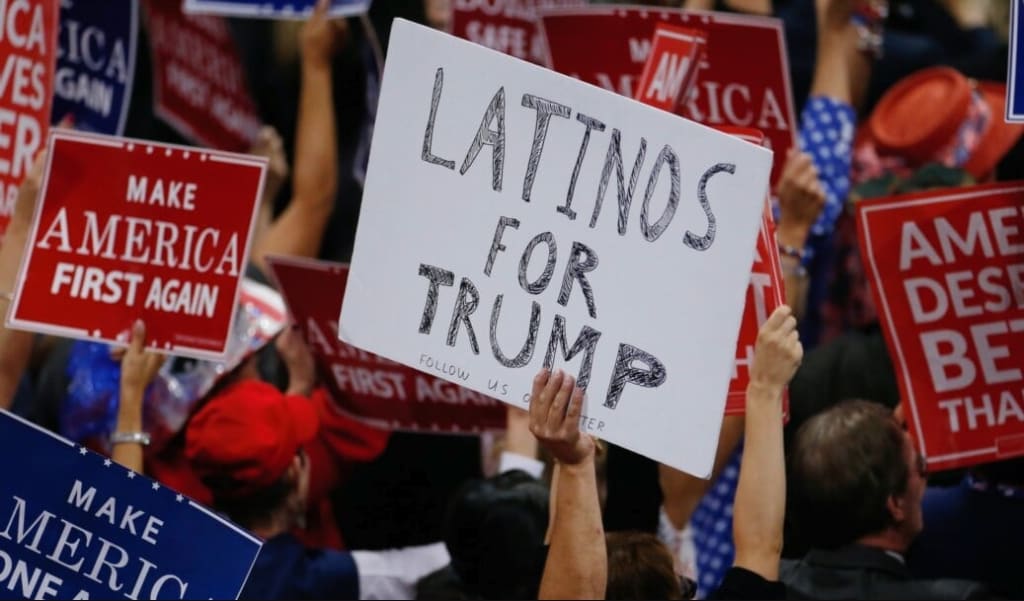
According to Clarissa Martínez-de-Castro, vice president of UnidosUS’s Latino Vote Initiative, Latino voters will play a “decisive role” in the 2024 presidential election.
Martínez-de-Castro suggested that their impact is likely to be enhanced because they are “geographically concentrated” in both battleground states and states with a lot of Electoral College votes, with roughly 25% participating in their first presidential election.
According to VORNews recent polls, the race between Joe Biden and Donald Trump, the Democratic and Republican presumed presidential nominees, is tight.
A Marist National Poll of 1,192 registered voters conducted in mid-April gave Biden a three-point lead in a head-to-head matchup, with 51% of the vote against Trump’s 48%.
However, a Public Opinion Strategies poll for NBC News done during the same time period found Trump at 46% to Biden’s 44%.
Martínez-de-Castro told Newsweek that Latinos will play a significant role in the 2024 election. They play a vital role in the winning formula for the White House, Congressional balance of power, and several state and municipal elections.
“Latinos are geographically concentrated in states with a high number of primary delegates and Electoral College votes (California, Florida, New York, and Texas), electoral battlegrounds (Arizona and Nevada), or both.
Furthermore, given razor-thin margins of victory, even in battleground states with lower Latino populations—such as Georgia, Pennsylvania, and Wisconsin—these voters have the potential to change the outcome.”
According to figures gathered by UnidosUS, 31.2 million Hispanic Americans of voting age participated in the 2022 midterm elections, with 18 million registered to vote and 11.8 million casting ballots.
Latino voter registration for 2024 Election
Martínez-de-Castro noted that expanding Latino voter registration might significantly impact the 2024 election race. He stated that it is common for Latinos to report that no one had approached them about voting or urged them to register.
She said, “Building on the fact that more than 80% of Latino registered voters vote in presidential elections (88 percent in 2020), a critical opportunity is addressing the registration gap, which is 13 million and growing.”
“Yet, underinvestment and ineffective outreach to these people continue, exacerbated by incorrect perceptions about this constituency. Much of the work to reduce the registration gap has been left to nonpartisan, nonprofit organizations, who have received little money, especially when contrasted to the expenditures seen during each election cycle.”
UnidosUS commissioned BSP Research to conduct a poll of 3,037 eligible Latino voters in the United States from November 2 to 13, 2023.
According to the survey, 47 percent approved of Biden’s performance as president, while 44 percent disagreed and nine percent said “don’t know.”
In all, 48 percent said they felt the Democrats “cared a great deal” about the Latino population, while 41 percent said they “don’t care much” and 11 percent called them “hostile.”
In comparison, only 25% thought Republicans “care a great deal” about Latinos, while 48% said they “don’t care much” and 26% saw them as “hostile.”
Hispanic Voters Shifting Away from Democrats
According to current research, Hispanic voters, defined as individuals having origins in a Spanish-speaking country and the majority of whom are Latino, are shifting away from the Democratic Party.
For example, a recent American Principles Project/On Message study of Hispanic voters in Arizona and Nevada found Trump and Biden tied with 43 percent and 44 percent, respectively.
Martínez-de-Castro acknowledged “erosion” in Latino support for the Democrats, but disputed media accounts that exaggerated the trend.
She stated, “Generally, at the presidential level, Latino voter support has averaged about two-thirds for Democrats and one-third for Republicans.” The combined average of all available election-eve and exit poll data from 1988 to 2020 is 29 percent Republican support and 67 percent Democratic support.
“The top point for Republicans was George W. Bush in 2000 (40 percent), whereas for Democrats, depending on the polling source, Bill Clinton, Barack Obama, or Hillary Clinton all received more than 70 percent.
Democrats gained much of the Latino support that Republicans lost over the last decade. But Democrats did not solidify that support in their column, so Republicans are regaining some of those votes.”
Martínez-de-Castro stated that a November 2023 UnidosUS poll revealed that Latino voters prioritize a well-managed immigration system with border security.
“Where immigration is concerned, the top priorities for action for Latino voters are relief for the long-residing undocumented population and for Dreamers/DACA (Deferred Action for Childhood Arrivals) recipients,” she said in a statement.
On the central subject of abortion, the UnidosUS poll revealed that 71% of Latino voters either strongly or somewhat agreed with the statement that “no matter what my personal beliefs about abortion are, I think it is wrong to make abortion illegal and take that choice away from everyone else.”
About the Creator
VORNews
VOR News—Voice of Reason is a nonprofit, nonpartisan site offering unfiltered, non-biased news from the US, Canada, the UK, and the world.






Comments
There are no comments for this story
Be the first to respond and start the conversation.